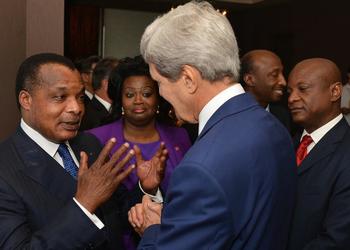
WASHINGTON, DC, August 5, 2014 (ENS) – U.S.-Africa cooperation on climate, wildlife trafficking and food security are center stage in Washington this week as President Barack Obama, the first U.S. President with African heritage, hosts nearly 50 African leaders at the White House.
President Obama said, “I do not see the countries and peoples of Africa as a world apart; I see Africa as a fundamental part of our interconnected world – partners with America on behalf of the future we want for all of our children. That partnership must be grounded in mutual responsibility and mutual respect.”
The three-day U.S.-Africa Leaders Summit, the first such event in history, includes civil society and business leaders, young African leaders, and members of Congress. It is “by far the largest engagement by any American President with Africa,” Ben Rhodes, the deputy national security advisor for strategic communications told reporters on a conference call Friday.

At the U.S.-Africa Leaders Summit, the United States and African countries reaffirmed their shared commitment to tackling together the challenges of climate change and poverty and to partnering to build resilience to these kinds of shocks. They also stressed their commitment to promoting low-carbon economic development and clean energy access on the African continent.
Disasters and shocks, whether natural or resulting from human activities, can throw poor and marginal populations into crisis and wipe out hard-earned development gains.
“These disasters and shocks are occurring with greater frequency and intensity, making it difficult to build resilient communities, particularly in countries facing severe socio-economic challenges exacerbated by the effects of climate change,” the White House said in a statement today.
At the Summit, USAID and the Rockefeller Foundation announced a $100 million Global Resilience Partnership to help safeguard some of the world’s most vulnerable people from disasters and shocks.
The money will be invested in preparedness, adaptation, and inclusive economic growth that can help communities function better day-to-day and, when a crisis hits, realize a resilience dividend, the White House said.
The Resilience Partnership will focus its efforts in three regions with historically high vulnerability to recurrent shocks – the Sahel, the Horn of Africa, and South and Southeast Asia – and build on work already being done by USAID, the Intergovernmental Authority on Development in East Africa, and Economic Community of West African States.
The Resilience Partnership will operate through three global centers, including two in Africa. It aims to increase the ability of people, communities, systems, and countries to forecast, manage, and adapt to a variety of risks, in part by fostering innovative resilience-building technologies and practices, such as index-based livestock and crop insurance and water harvesting.
The Partnership will act to increase the capacity of critically important local, regional, and global institutions to build resilience.
Catalyze alliances across a broad range of private and public sector actors to leverage and scale resilience investments and innovations.
Working together to implement the Malabo Declaration: As part of the African Union’s Year of Agriculture and Food Security, leaders agreed in the Malabo Declaration to accelerate agricultural growth as the primary strategy to end poverty in Africa, to reduce vulnerability to climate and weather related risk, and to mainstream resilience and risk management. At the Summit this week, the African Union shared its roadmap to implement the declaration, and the United States announced several opportunities to partner with African nations in support of these objectives, including:
The Obama Administration has made a commitment to serve as founding members of the global Alliance for Climate Smart Agriculture, slated for launch at the United Nations Secretary-General’s Climate Summit on September 23, 2014.
“Climate change is a global challenge that requires a global solution,” said the White House in a statement issued today. “The United States is working with our African partners to develop a new ambitious and effective international climate change agreement in 2015 that motivates ambitious action on the part of all countries consistent with their national circumstances and capabilities.”

In support of food security, the U.S. government has announced its commitment to serve as a founding member of the global Alliance for Climate Smart Agriculture, planned to launch at the United Nations Secretary-General’s Climate Summit on September 23 in New York.
In partnership with the African Union Commission, the United States will contribute more than US$10 billion in planned socially responsible private sector investments through the New Alliance.
The U.S. government will also continue its technical assistance to incorporate climate smart agriculture into national and regional plans and to use climate data, modeling, and training to assist countries in adopting climate smart approaches.
Sierra Leone, the Ghana Open Data Initiative, IBM, and Kellogg Company announced they would join the United States as partners in the Global Open Data for Agriculture and Nutrition (GODAN) initiative. GODAN supports global efforts to make agricultural and nutritional data available and accessible for unrestricted use worldwide.
The United States also pledged an investment in the World Bank’s Agricultural Insurance Development Program to provide analysis and technical assistance to countries to design and implement sustainable, cost-effective public-private partnerships in agricultural insurance in order to increase the financial resilience of rural households.
The United States will continue to support African countries through the President’s Global Climate Change Initiative (GCCI), whose aim is to help developing countries build resilience to the effects of climate change and chart a course for low-emission development.
The GCCI has supported climate change solutions ranging from investing in climate information services in Uganda and Mali, to addressing the causes of deforestation in Zambia, to investing in clean energy solutions in Kenya, to improving management of climate-vulnerable water resources in trans-boundary river basins in southern Africa.
Copyright Environment News Service (ENS) 2014. All rights reserved.
